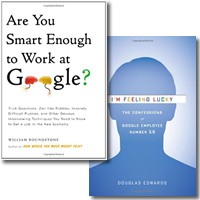Book Reviews: Google These Books!

Poundstone, William. Are you smart enough to work at Google?. Little, Brown & Co., 2012.
Edwards, Douglas . I’m feeling lucky : the confessions of Google employee number 59. Houghton Mifflin Harcourt, 2011.
Admission to Fuqua (or anywhere at Duke) certifies you as being smart. Very smart. But are you smart enough to outcompete other graduates of top tier business schools to win an ideal position with an A-list employer? Yes, of course, but first you must survive a difficult interview process.
In a new book, Are you smart enough to work for Google? William Poundstone discusses the interview process at innovative companies like Google, Microsoft and Apple as they try to identify and hire the best candidates. He reveals dozens of brainteasers and bizarre interview questions, with over 100 pages of answers and explanation. He also covers the interview process and preferences at key employers like Google, and shows how to decode an interviewer’s hidden agenda. All this makes for interesting reading, but even at the last page, readers still will not know if they are smart enough to work in The Plex. A trip to Mountain View is required for that.
One person who was smart enough to work for Google was Douglas Edwards, author of a new book, I’m Feeling Lucky. In 1999 just after Google had secured $25 million in venture capital funding, Edwards quit his steady position at the San Jose Mercury News, an old style newspaper organization, to join Google, a start-up with only 60 employees, no revenue and an unlikely business plan. His book is about what it was like to transition from a unionized, tradition-encrusted organization to an environment where all the old rules no longer applied.
Edwards revealed Google as a company founded by two Stanford engineers who valued superior technology, efficiency and frugality. The goal was to establish a company that would build a search engine for websites on the internet and for corporate extranets, one that would eventually become the center of global knowledge transfer. All employees were expected to work long hours under constant pressure. With no organizational chart, job titles were generic and the environment seemed status-blind. Everyone contributed what they could, yet it was clear that the engineers were the keys to success. The emphasis was on developing a superior product, while marketing was relatively unimportant and branding was suspect.
This is one employee’s view of Google from its second year of operation through 2005, when Edwards lost his job in a reorganization, a year after the company went public. This personal story is a light and easy read.
© Reviewer: Meg Trauner & Ford Library – Fuqua School of Business.
All rights reserved.
Tags: Company history